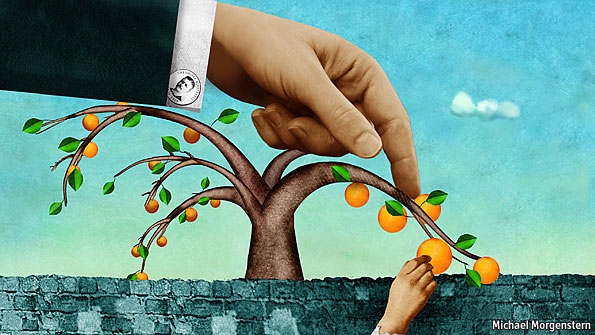I’m not with this article from The Economist 100%, but I feel like they are identifying the issues precisely:
Modern politics needs to undergo a similar reinvention—to come up with ways of mitigating inequality without hurting economic growth. That dilemma is already at the centre of political debate, but it mostly produces heat, not light. Thus, on America’s campaign trail, the left attacks Mitt Romney as a robber baron and the right derides Barack Obama as a class warrior. In some European countries politicians have simply given in to the mob: witness François Hollande’s proposed 75% income-tax rate. In much of the emerging world leaders would rather sweep the issue of inequality under the carpet: witness China’s nervous embarrassment about the excesses of Ferrari-driving princelings, or India’s refusal to tackle corruption.
At the core, there is a failure of ideas. The right is still not convinced that inequality matters. The left’s default position is to raise income-tax rates for the wealthy and to increase spending still further—unwise when sluggish economies need to attract entrepreneurs and when governments, already far bigger than Roosevelt or Lloyd George could have imagined, are overburdened with promises of future largesse. A far more dramatic rethink is needed: call it True Progressivism.
My chief skepticism, as someone coming from the right, is the idea that answers come from the top. This is partly because of my own peculiar brand of anti-authoritarianism. It’s a theme in my religious commentary (I think Mormons depend on their leaders too much) and also my political outlook. It’s also a belief that searching for solutions from the top because the problem itself, and more attempts to solve inequality through top-down policies are just going to dig the hole deeper. I think that poverty and inequality are primarily social and not economic phenomena, and what we need are indirect policies that lay the groundwork for a healthy society. Simple example: no-fault divorce leads to higher divorce leads to weakening marriages leads to more kids without a father which is probably the single-greatest detriment in our society. Would repealing no-fault divorce improve GDP this year? Of course not, but it’s the kind of quiet, indirect policy that I believe would–over time–have a huge impact.
I’m not against short-term programs, but I’m dubious they amount to much more than bailing out a ship with hole in it.
